Pre-sales support is a critical stage in the sales process that often determines whether potential customers will proceed with a purchase. It involves engaging with prospects early in their journey to address their needs, provide honest advice, and help them make informed decisions. Pre-sales activity set the foundation for higher client satisfaction, long-term client relationships, and repeat business. Sales preparation support is about more than just providing information. Adding a human touch helps potential customers feel valued and understood, setting the stage for stronger relationships and better conversion rates.
In this article, we’ll explore everything you need to know about pre-sale support. From its importance and benefits to performance tips and proven techniques, you’ll discover how companies can align their Revenue team, marketing team, and support agents to meet consumer expectations. Let’s dive in to ensure your business converts more leads and fosters satisfied customers.
Understanding Pre-Sales Support
What is Pre-Sales Support?
Pre-sales support is the phase where sale teams work to engage potential customers before an actual purchase is made. This involves a range of Sales readiness activities, such as answering user questions, conducting product demonstrations, providing proposal assistance, and clarifying product details. It serves as the bridge between marketing efforts and the formal sales process. Companies leverage Sales enablement to bridge the gap between marketing and sales efforts, ensuring a smooth transition for potential customers.
Key Responsibilities of Pre-Sales Teams:
- Lead Generation and Qualification: Identifying and focusing on qualified leads to maximize conversion rates.
- Customer Engagement: Having Pre-transaction support conversations to understand client expectations and provide tailored solutions.
- Proposal and Product Assistance: Assisting with detailed proposals, product specifications, and technical knowledge to guide customers faster toward decisions.
- Building Trust: Establishing honest and proactive support to build loyalty and align with brand values.
Pre-Sales vs. Post-Sales Support
Pre-sales support focuses on attracting and nurturing Interested prospects by providing answers, showcasing product benefits, and helping them make confident buying decision. It sets the stage for a successful purchase. However, the user journey doesn’t end there. This is where post sales support comes into play, ensuring that customers have the resources and assistance needed to use the product effectively and resolve any concerns after the purchase.
While Sales preparation aims to build trust and drive conversions, post sales support fosters end-user loyalty and satisfaction. Together, they create a seamless experience. Sales prospecting lays the groundwork by understanding customer needs, while post sales support ensures those needs continue to be met, resulting in repeat business and positive word-of-mouth.
For businesses, balancing both Sales readiness and post sales support is crucial. A strong Preliminary sales phase process can reduce the workload for post sales support team by setting clear expectations and addressing potential concerns early on. At the same time, exceptional post sales support builds on Customer acquisition phase efforts to solidify long-term relationships and strengthen brand reputation.
The Importance of Pre-Sales Support
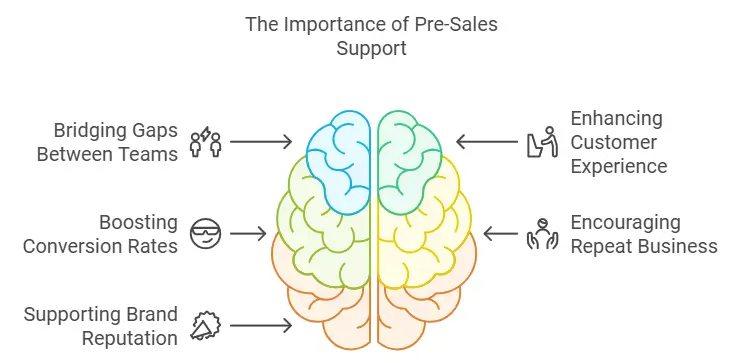
Pre-sales support plays a vital role in ensuring a seamless sales process and meeting consumer expectations. It’s not just about closing deals; it’s about creating a strong foundation that supports Stable client relationships and repeat purchases.
Bridging Gaps Between Teams
Pre-sale teams act as a crucial link between the marketing agent and the sales team. They ensure that Skilled leads move smoothly from lead generation to the sale phase, creating a cohesive journey for leads.
Enhancing Customer Experience
Customers expect personalized, proactive support agents during the decision-making process. Providing accurate information, addressing ethical concerns, and offering honest advices builds confidence and sets the stage for higher customers satisfaction.
Boosting Conversion Rates
Pre-sale support team helps Prospective clients feel confident in their buying decisions. A strong Lead nurturing process journey clarifies doubts, highlights the value proposition, and shortens the decision-making process, resulting in more sales.
Encouraging Repeat Business
When repeat customers engage with a knowledgeable Early sales cycle, they are more likely to become satisfied customers who return for repeat purchases. This strengthens customer loyalty and turns them into brand ambassador.
Supporting Brand Reputation
Delivering consistent and reliable Pre-purchase assistance aligns with your brand values, leading to positive reviews and stronger customers trust in your company.
Benefits of Effective Pre-Sales Support
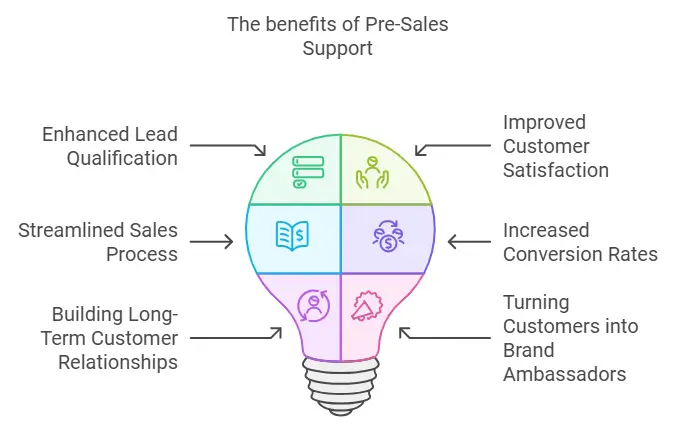
Implementing a robust pre-sales support strategy brings significant advantages to businesses and customers alike. Here’s how it contributes to the success of your sales process:
Enhanced Lead Qualification
Pre-sales support identifies and focuses on qualified leads, saving your sales team time and effort. By using tools like consumer data study and market research, Pre-transaction support activities ensure that Selling teams only engage with prospects who are ready to make informed decisions. Customer engagement support helps identify and focus on qualified leads, saving time for the sales team. By targeting the right prospects, businesses can prioritize efforts on those most likely to convert, ultimately laying the foundation for customer trust and brand loyalty.
Improved Customer Satisfaction
Customers expect clear and accurate information during the Initial customer engagement phase. Engaged support, such as addressing customer questions and providing product details, helps create a positive experience, leading to higher customers satisfaction. Clear, Forward-thinking support during the Pre-transaction support phase ensures that customers feel valued and understood. This personalized attention creates a positive experience that not only drives immediate purchases but also fosters brand loyalty in the long run.
Streamlined Sales Process
Pre-sales conversations help Revenue team understand client needs early on. This allows the sales process to be tailored and efficient, ultimately leading to faster decision-making and more purchases. A well-structured Lead nurturing process phase ensures optimal utilization of resources, supporting an efficient cost center that minimizes unnecessary overhead.
Increased Conversion Rates
Providing value-driven pre-sale support improves the likelihood of turning Future buyers into paying customers. Techniques like Proposal support, constant communication, and a strong understanding of customer expectations boost conversion rates.
Building Long-Term Customer Relationship
Effective Pre-sale consultation lays the groundwork for ongoing support after the initial purchase. This approach helps develop long-term user relationships and encourages Sustained patronage.
Turning Customers into Brand Ambassadors
Satisfied customers are more likely to provide positive reviews and promote your brand through word-of-mouth. Pre-sale teams that focus on delivering ethical advice and aligning with brand value help foster this loyalty.
Techniques to Enhance Pre-Sales Support Performance
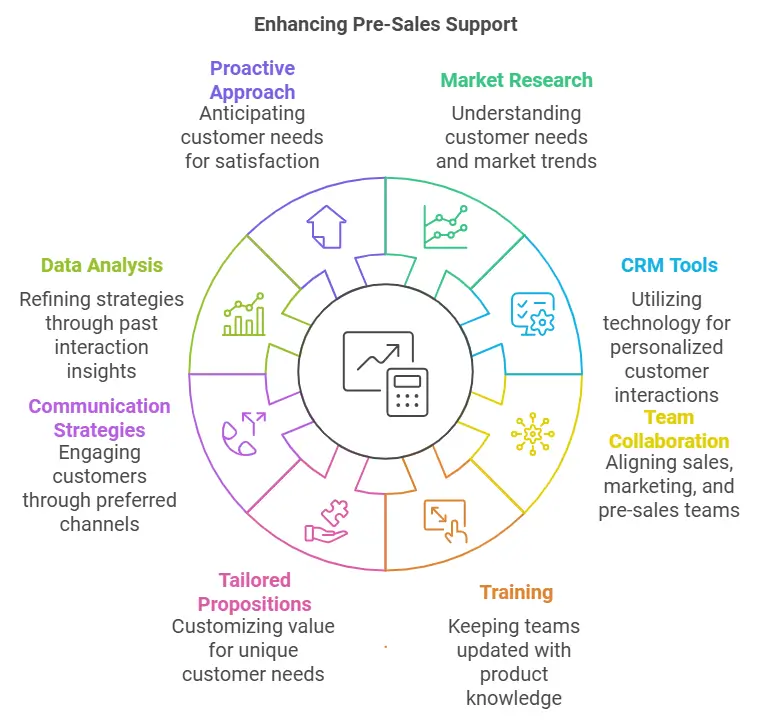
Improving pre-sales support requires a mix of strategic planning, effective communication, and leveraging technology. Here are some proven techniques to take your pre-sales efforts to the next level:
Conduct Comprehensive Market Research
- Understanding your target market is essential. Equip your pre-sales team with insights about customer preferences, market trends, and competitor offerings to provide tailored solutions. This strengthens your ability to meet customer expectations and deliver value.
Leverage CRM and Automation Tools
- Use CRM systems to track customer data and interactions, ensuring that your sales team can provide personalized recommendations. Automation tools can help streamline repetitive pre-sale activities, allowing your team to focus on building stronger customer relationships.
Encourage Collaboration Across Teams
- Foster communication between the pre-sales, sale, and marketing teams. Aligning these teams ensures a seamless journey for Target audience and increases the chances of generating more sale.
Train Pre-Sales Teams Regularly
- Continuous training helps pre-sales agents stay updated with product knowledge, technical expertise, and industry trends. A knowledgeable team can answer Buyer questions more effectively, empowering prospects to make confident buying decisions.
Develop Tailored Value Propositions
- Every customer is unique, and so are their needs. Focus on creating customized value propositions during pre-sales conversations to highlight how your product or self service addresses their specific challenges.
Enhance Communication Strategies
- Adopt a customer-first approach by communicating through preferred channels. Whether it’s live chat, email, or phone, ensure regular updates to address customer asks promptly.
Use Data Analysis to Improve Performance
- Analyze past pre-sales interactions to identify areas of improvement. Pay attention to patterns in User concerns, conversion rates, and feedback to refine your strategies and enhance the overall pre-sales journey.
Adopt a Proactive Approach
- Anticipate customer needs before they ask. Providing information such as detailed product specifications or Proposal guidance early on demonstrates your commitment to customer satisfaction.
By adopting these techniques, businesses can build stronger connections with potential customers, boost conversion rates, and ensure a smooth transition from the Sales groundwork phase to purchase.
Performance Tips for Pre-Sales Support
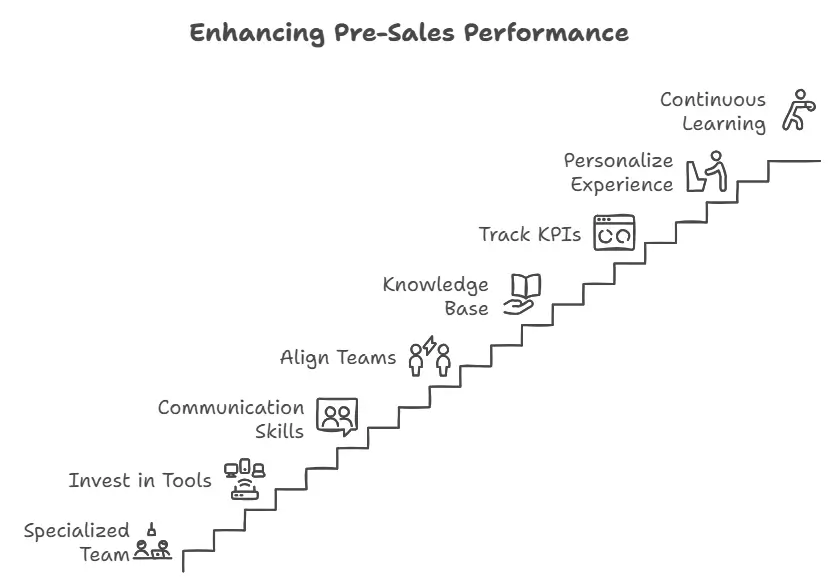
Maximizing the effectiveness of your pre-sale support involves fine-tuning your team’s approach, leveraging the right tools, and aligning efforts with customer needs. Here are practical tips to enhance pre-sales performance:
Build a Specialized Pre-Sales Team
- Ensure your pre-sales team includes individuals with technical product knowledge, excellent communication skills, and a strong understanding of your product or self service. A skilled team can confidently guide potential customers through the pre-sale journey.
Invest in Technology and Tools
- Equip your team with advanced tools such as CRM systems, AI-powered chatbots, and data visualization platforms. These tools streamline the sale process, support team proactive engagement, and help teams address customer questions quickly.
Develop Effective Communication Skills
- Strong communication is at the core of successful pre-sale conversations. Teach your team to listen actively, provide clear and concise answers, and adapt their style to the customer’s preferred channel.
Align Pre-Sales with Marketing and Business development team
- Collaboration between pre-sale, marketing, and Business development team ensures that leads move seamlessly through the pipeline. Marketing can provide insights on customer expectations, while Account executives benefit from pre-sale activities that qualify leads and build trust.
Create a Knowledge Base
- Provide your team with access to an updated repository of product details, case studies, and FAQs. This empowers pre-sales agents to answer customer asks confidently and with accurate information.
Track and Measure KPIs
- Monitor key performance indicators such as lead conversion rates, average response time, and customer satisfaction scores. Use this data to identify strengths and areas for improvement.
Personalize the Customer Experience
- Tailor your approach to the unique needs of each potential customer. Use customer data to provide relevant solutions and highlight how your product meets their specific challenges.
Focus on Ethical and Honest Advice
- Building trust with most customers requires transparency. Avoid overpromising and focus on delivering solutions that genuinely meet their expectations. This builds long-term customer loyalty.
Foster Continuous Learning
- Encourage your team to regularly update their skills through workshops, training sessions, and certifications. A knowledgeable and adaptable team can navigate evolving customer needs and market conditions effectively.
Maintain Constant Communication
- Regularly follow up with prospects to keep them engaged throughout the Prospective sales assistance phase. Address any concerns promptly, as most customers expect timely responses to feel confident in their purchase decision.
Implementing these performance tips will ensure your pre-sales team is equipped to convert more leads, build customer loyalty, and contribute to your business’s long-term growth.
Measuring Pre-Sales Success
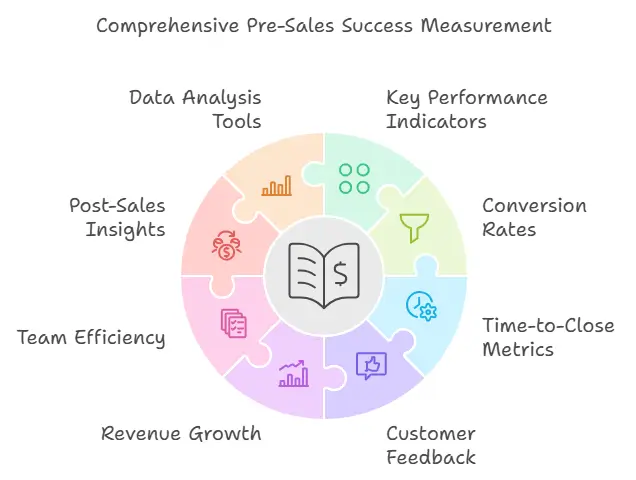
Tracking the performance of your pre-sales efforts is crucial for ensuring consistent improvement and aligning with business goals. Here’s how to measure the success of your pre-sales activity effectively:
1. Monitor Key Performance Indicators (KPIs)
Use measurable KPIs to evaluate the effectiveness of pre-sales support. Focus on metrics like:
- Lead Conversion Rates: Percentage of qualified leads that progress to the sale phase.
- Customer Satisfaction Scores: Feedback from potential customers on their pre-sales experience.
- Response Time: Average time taken to address User inquiries or provide support.
2. Track Conversion Rates Across the Sales Funnel
Measure how effectively leads move through each stage of the pre-sales journey. Analyze where potential customers drop off to identify areas for improvement.
3. Evaluate Time-to-Close Metrics
Assess how pre-sales activities contribute to reducing the sales cycle duration. Faster conversion times indicate efficient pre-sale support.
4. Analyze Customer Feedback
Regularly collect feedback from more customers about their pre-sale experience. Identify patterns in Buyer expectations and areas where the pre-sales team excels or needs improvement.
5. Measure the Impact on Revenue Growth
Evaluate how pre-sale efforts contribute to overall sales growth. A successful Sales groundwork phase leads to more purchases, higher customer satisfaction, and Recurrent transactions.
6. Assess Team Efficiency
Monitor the performance of individual pre-sales agents and the team as a whole. Use metrics like the number of proposals generated, customer interactions completed, and leads qualified.
7. Use Post-Sales Insights
Gather insights from the post-sales support team to understand how well pre-sale prepared new customers for their purchase. This provide feedback loop helps refine the pre-sales approach.
8. Leverage Data Analysis Tools
Use Statistical analysis tools to identify trends, measure outcomes, and gain actionable insights into the effectiveness of your pre-sale support.
By regularly measuring these aspects, company can identify areas to optimize and ensure their pre-sale strategies align with customer needs and business objectives.
FAQs
1.What is presales support?
Pre-sale support helps customers get answers to their questions about making their first purchase, managing the sales process, and closing the deal. The support team acts like salespeople, helping new customers turn prospects into happy buyers.
2.What is a pre-sale service?
Purchasing starts before a product is sold. Initial customers engagement focuses on understanding customer needs early to ensure the product is the right fit.
3.What is the difference between pre-sale and post sales support?
Pre-sale support simplifies the sales process by answering Prospect queries and showcasing product features. It helps meet customer needs, enabling faster purchase decisions, and is offered free of charge from initial contact to product purchase.
4.What tools can enhance pre-sales support?
Tools like CRM systems, data analytics platforms, and automation tools help streamline pre-sale activities. These tools allow teams to track customer interactions, analyze data, and respond to inquiries quickly and accurately.
5.What is pre-sales support, and why is it important?
Preliminary customer support involves activities that help potential customers make educated decisions before purchasing. It’s important because it ensures a smooth transition from interest to purchase, increases conversion rates, and fosters long-term customer relationships.
Conclusion
Pre-sales support is a vital component of the sales process, ensuring potential customers feel confident and informed before making a purchase. By bridging the gap between marketing and sales, Early sales cycle teams play a key role in meeting Client requirements, boosting conversion rate, and fostering long-term customer relationships.
In this guide, we’ve explored the definition, importance, and benefits of pre-sale support, along with practical techniques and tips to enhance its performance. From leveraging Data evaluation to training your team on technical knowledge and communication skills, every aspect of Lead nurturing process can contribute to higher customer satisfaction and Ongoing business.
To truly excel, businesses must consistently measure the success of their pre-sales activities and refine their approach based on data and customer feedback. With the right strategies in place, companies can turn their pre-sales phase into a powerful driver of growth and Client retention.


